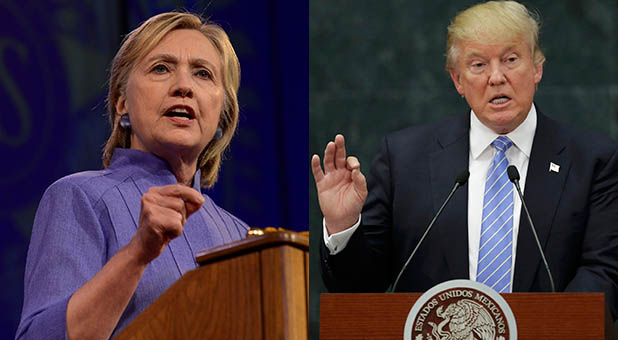What Happens If Hillary Clinton or Donald Trump Dies Before Jan. 20
Regardless of whether Donald Trump or Hillary Clinton becomes the 45th President of the United States, he or she will be among the oldest presidents ever.
At 70 years old, Donald Trump is already the oldest presidential candidate ever. At nearly 69 years old—Hillary Clinton’s birthday is in late October—she is nearly as old as Ronald Reagan, the oldest first-term president ever.
With concerns over Clinton’s health now making headlines, the morbid—but entirely logical—question is, simply: What happens if either of them die before the election?
The Constitution doesn’t address that issue. Rather, it merely provides the means by which the president and vice president are to be elected. Article II, Section 1 states:
Each state shall appoint, in such manner as the Legislature thereof may direct, a number of electors, equal to the whole number of Senators and Representatives to which the State may be entitled in the Congress: but no Senator or Representative, or person holding an office of trust or profit under the United States, shall be appointed an elector.
The electors shall meet in their respective states, and vote by ballot for two persons, of whom one at least shall not be an inhabitant of the same state with themselves. And they shall make a list of all the persons voted for, and of the number of votes for each; which list they shall sign and certify, and transmit sealed to the seat of the government of the United States, directed to the President of the Senate. The President of the Senate shall, in the presence of the Senate and House of Representatives, open all the certificates, and the votes shall then be counted. The person having the greatest number of votes shall be the President, if such number be a majority of the whole number of electors appointed; and if there be more than one who have such majority, and have an equal number of votes, then the House of Representatives shall immediately choose by ballot one of them for President; and if no person have a majority, then from the five highest on the list the said House shall in like manner choose the President. But in choosing the President, the votes shall be taken by States, the representation from each state having one vote; A quorum for this purpose shall consist of a member or members from two thirds of the states, and a majority of all the states shall be necessary to a choice. In every case, after the choice of the President, the person having the greatest number of votes of the electors shall be the Vice President. But if there should remain two or more who have equal votes, the Senate shall choose from them by ballot the Vice President.
The Congress may determine the time of choosing the electors, and the day on which they shall give their votes; which day shall be the same throughout the United States.
That date is the first Tuesday in November, not the first day of the month—in other words, somewhere between Nov. 2 and 8—in even-numbered years divisible by four. But, by giving Congress the power to change the date, if necessary, it has led to speculation that the death of a candidate—or any national emergency—could be the means of delaying or postponing the election.
No presidential candidate has ever died prior to the election, so it would be speculative, at best, to know how Congress might respond to such a situation. The Republican and Democratic parties, however, have contingency plans for such instances, if they should ever occur.
If Clinton were to fall off the ticket, for any reason, Democratic National Committee members would gather to vote on a replacement. The rules for how that would happen are somewhat vague, however, stating only that a majority of members must be present at a special meeting called by the committee chairman.
If Trump were to be removed from the ticket, the Republican National Committee’s rules state that the 168 members would decide whether to select a replacement on its own or reconvene the 2,472-delegate national convention. If the RNC itself chooses a replacement, each state’s triumvirate—committeeman, committeewoman and chairman—would carry the same number of votes as the state had at the national convention.
The RNC rules also allow for the state delegations to split their vote, and for members to vote by proxy.
If either candidate would be unable to perform the duties of his or her office after the election, even before the Jan. 20 inauguration, the 20th Amendment would dictate how the order of succession would occur. In the case of Trump, Indiana Gov. Mike Pence would become president. In the case of Clinton, U.S. Sen. Tim Kaine (D-Va.) would be inaugurated.




























































